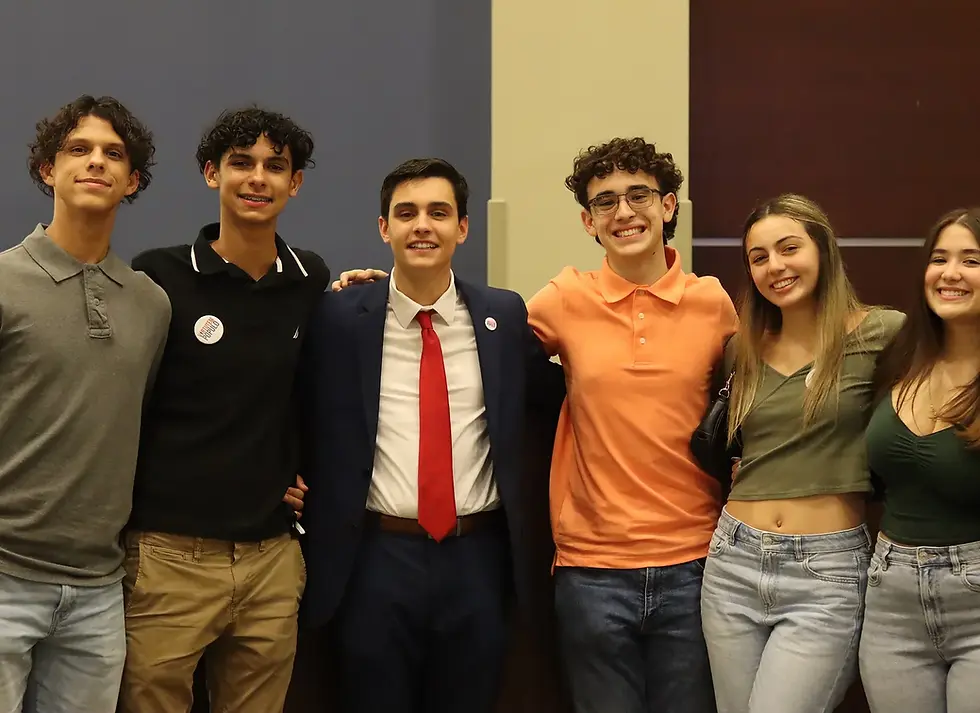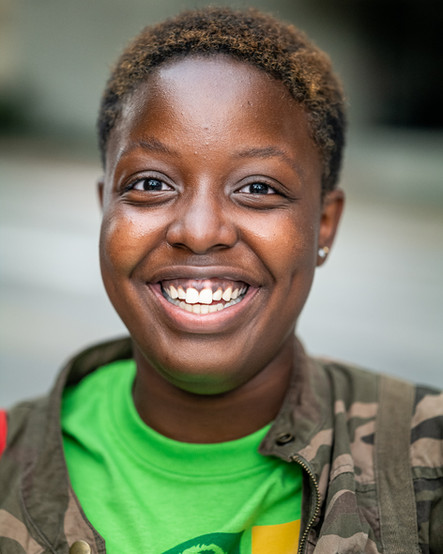WHY NOT US?
- Yulia Strokova

- May 24, 2023
- 8 min read
Updated: Nov 19, 2023
Young activists are using their creativity, authenticity and collective power to rewrite social narratives and policies. Will you join them?
Will Charouhis from Miami's Ransom Everglades High School will be celebrating his 18th birthday with an impressive list of accomplishments. He can't vote yet, but he's already founded a Miami-based nonprofit Forces of Nature, planted more than 1000 mangrove trees, met with Barack Obama at COP26 in Glasgow, received the Congressional Award Gold Medal, served as a National Youth Leader in Dr. Jane Goodall's Institute, pushed his school to eliminate single-use plastics, and much more. It seems Will has figured out how to overcome "eco-anxiety" – the term experts use to describe the chronic fear of environmental doom, which is especially common among young people – through education, urgency, and action:
"That minute-before-midnight mentality that pervades my peers – it's real. We are facing the greatest climate crisis to ever face humanity. But I am an optimist. And I refuse to see the world through a bleak lens," Will states. "I believe hope is the most powerful antidote in the universe. We now have the solutions to halt climate change. And we can rewrite our narrative. Every change that ever happened in this world started with the power of one."
Will discovered his "ecosystem of hope" in his own backyard. Living near the water and going kayaking, he cleaned up six miles of the mangrove coastline. Once the pandemic restrictions eased, he engaged his friends and school community to organize monthly cleanups to remove ocean trash and plastics that clog mangrove roots. This allows mangroves to regenerate and grow naturally.
"If everyone in the world plants just three mangrove seedlings or cleans out the roots of just one bed of mangroves, we can amass enough new forest area to absorb a third of carbon emissions and reach the planet's necessary goal of net zero," encourages Will.
Mangrove forests are up to five times more effective at storing carbon compared to tropical forests and 1000x more cost-efficient at protecting coastlines than seawalls. These remarkable trees provide critical habitats for fish and marine nurseries and revive seagrasses by filtering run-off. As powerful environmental guardians, they also reduce erosion, mitigate sea-level rise, and protect our houses and infrastructure from hurricane-driven storm surges.
While academics, engineers, and local authorities debate grey development like a $5 billion seawall in the fragile marine ecosystem of Biscayne Bay, Jonah Basi from Fort Lauderdale is also actively integrating green, nature-based solutions for coastal resilience.
Jonah goes paddling with the same mission: to collect propagules (seeds produced by red mangroves) floating in the water, bring them home, and put them in tanks to let the mangroves grow strong enough to transplant further. Today, this young activist runs his nonprofit movement, Mangrove Life, and engages his classmates to plant these seeds of life and clean the waterways. Jonah learned about the mangroves’ superpower from his mother, Jessica, an eco-enthusiast and psychology teacher.
“I've always tried to instill in my son and his friends the importance of our planet,” says Jessica. “We're at a tipping point where if we don't start doing more, it's going to be too late.”
Jamora Arroyo-Jefferson started her advocacy at age 9, and gave her parents a lot of the credit for this early start:
“They've encouraged me to be the truest version of myself,” she says.
Jamora is the kind of person who knows how to get her point across. Even talking to her one-on-one, her gift for leadership is obvious and inspiring. Today, she’s 17, and leads environmental education initiatives with Miami Waterkeeper, and it all started with chip bags.
“I saw how many chip bags were being thrown away. So I started an initiative where all my classmates would collect those chip bags during lunch. I took them home and later, gave them to our recycling plant in Miami. I would definitely consider that my first act of environmentalism.”
As president of her school’s gender and sexuality association, she plays a direct role in dispelling misconceptions and stereotypes about the LGBTQ+ community with trivia and Q&A events designed for all students’ enjoyment. As an impact agent with The Women’s Fund of Miami-Dade, she volunteers to help promote women’s advocacy efforts among other women her age on social media.
Jamora’s always looking for ways to spread her vibrant kindness – she recently earned the inaugural Breakthrough Miami and Miami Dolphins Jason Jenkins Community Service Award for it. But she also knows what it’s like to be on the receiving end.
“I have always been a good student,” she continues. “However, around 6th grade, I was struggling with certain aspects of my reading and math comprehension. The psychoeducational evaluation revealed I have dyslexia, difficulty with reading or interpreting words, and dyscalculia, a learning disability in math. With the continued love and support of my family and friends, guidance from my mentors, I will not let these learning challenges limit my future achievements.”
Jamora’s future looks bright. She hopes to combine her interests in the arts, the environment and social justice with a degree program in sustainable design.
“I want to be able to create the cities of the future, whether it's here on Earth or in outer space – entire communities that are built on renewable energy and are able to meet people's basic needs, whether it be food or access to affordable housing so that we're able to progress our society and not worry about the basics,” she says.
Speaking with Maurits Acosta, a high school sophomore, there is a feeling you are talking with a seasoned executive leader. Maurits runs his civic engagement nonprofit, Virtutem Populo, pushing young minds to take an active stance in their communities and get involved with local government.
“In the first emails we sent out to policymakers or professors at universities, we wouldn't say our ages because we felt that might sway them from speaking with us,” Maurits says.
In 2021, he championed new city ordinances with fellow Miami Lakes Middle School students after their school flooded. To succeed, the students’ appeals had to reach adults willing to listen. That’s what young activists need most.
“Let them into your office and meet with them,” Maurits states. “I know some adults who are hesitant, or have a certain perception of the current generation. But I've realized that when we’re given an opportunity and a platform, the possibility of our impacts is limitless.”
Maurits is one out of a wide population of kids whose education has been disrupted by extreme weather events. And according to a 2022 Government Accountability Office report, these incidents have long-standing consequences that disproportionately harm students already in socially vulnerable communities. It’s no wonder so many young activists are focused on climate change. They feel its effects already.
Blue Scholars Initiative | Photos by Angel Parra
Vision for a greener, healthier future is exactly what programs like Blue Scholars Initiative and Dream In Green hope to instill in more Miami-area students. These organizations also acknowledge that a connection with the environment is too often a privilege.
Environmental educator Meredith Bass has traveled worldwide on expedition cruises headed for diverse destinations from Antarctica to the South Pacific. But a desire to serve young people and help remove the barriers that block them from the water, led her to Shake-A-Leg, a sailing and vocational training center for people with disabilities, and later, Blue Scholars Initiative.
“Working with youth is really where my heart is. Children are just incredible beings, and they're so impressionable. They really don't have a view of, Oh, I really can't make a difference. It's too late,” she says.
On the water, online, and in classrooms, Blue Scholars Initiative shares Biscayne Bay’s beauty and significance with students across Miami-Dade County. Students learn about the plants and animals essential to the sparkling blue habitat and how humans can act against the harmful contributors threatening to dim it.
“We're teaching not only to learn but also to be invested in it,” Meredith says.
The same goes for Dream In Green, whose educational programs have reached more than 74,000 students in K-12 schools. They engage students in challenges to increase energy efficiency and reduce waste at school, deploy partnerships with Lady Green Recycling to empower schools to take recycling into their own hands, and award grants for student-led environmental initiatives.
Peace Corps alum and veteran educator Barbara Martinez-Guerrero, now Dream In Green’s executive director, says their programs bring up important feelings in students. She says adults have to balance the scary facts with the tangible change students can make.
“When students speak, you hear that anger. You hear that frustration. You hear that sense of my elders are failing me because they’re not acting now,” she says. “It’s figuring out what a student feels passionate about and giving them the tools to know how to express that.”
Photos by Greg Clark, Good Miami Project
Young people across the country are stepping up to act for their passions. March for our Lives, a student-led gun safety advocacy group created by survivors of the shooting at Marjory Stoneman Douglas High School in Parkland, has helped register more than 50,000 new voters. United We Dream has connected thousands of immigrant youth in person and online as they advocate for greater protection. But all of this work is happening because young people are facing snowballing attacks on their freedoms.
For many Florida students, the recent HB 999/SB 266 bills backed by Governor DeSantis would restrict discussion of race and gender in curricula at their public universities, and would block federal & state funding for the diversity, equity and inclusion programs they’ve never lived in a world without.
The bill, seen by many as a regression to a deeply racist past, is exactly the kind of oppressive action that Miami advocacy organization Power U mobilizes Black and Brown youth against. As the bill moved through the legislature, Power U and its alumni organized at protests with hundreds of other Florida students and answered questions from concerned students, parents and citizens at a town hall meeting.
Through Power U, students are learning to organize and speak up against injustice in community with people they’ve known for years and others they’ve just met. It’s a compelling collective skill, but it’s one the students don’t always see exemplified around them.
“Most people in my neighborhood, we don't really talk to each other unless something has happened,” says high school senior and Power U leader Kassidey Antenor.
Power U’s students – and all of the young advocates we talked to – are working on the front lines of the battles against racism, hate, environmental destruction, and more. Facing frustrating, frightening issues, they share their passions with mature, principled selflessness most adults can’t claim. But they also know their impacts aren’t only outward.
Kassidey knows how it feels to make real change. She and several other Power U students secured a powerful win for more equitable health textbooks at a Miami-Dade Public School board meeting. But her experiences with Power U, a group she joined after hearing their presentation in her fourth-period history class, have also changed her. She says she’ll be an advocate for life.
And, in part, it’s because adults in her life permitted her to explore. Kassidey could have been pigeonholed into one identity – an athlete, a smart kid, a troublemaker. But instead, she had the chance to experience a world where kids can make a change, and in it, she discovered something new.
“I've learned to be more myself, to speak out loud,” she says.
We hope you appreciated this paywall-free article. As an independent community-driven media, Impact.Edition elevates the voices of local changemakers who work toward positive, lasting change – from addressing social inequality to saving the planet from environmental ruin. We would be grateful if you would consider a small donation to support our volunteering editorial efforts and shared mission to empower people with best practices and creative solutions for a more just, more sustainable world. Any donation to Impact.Edition will be tax-deductible. Thank you for making a difference!




























































Comments